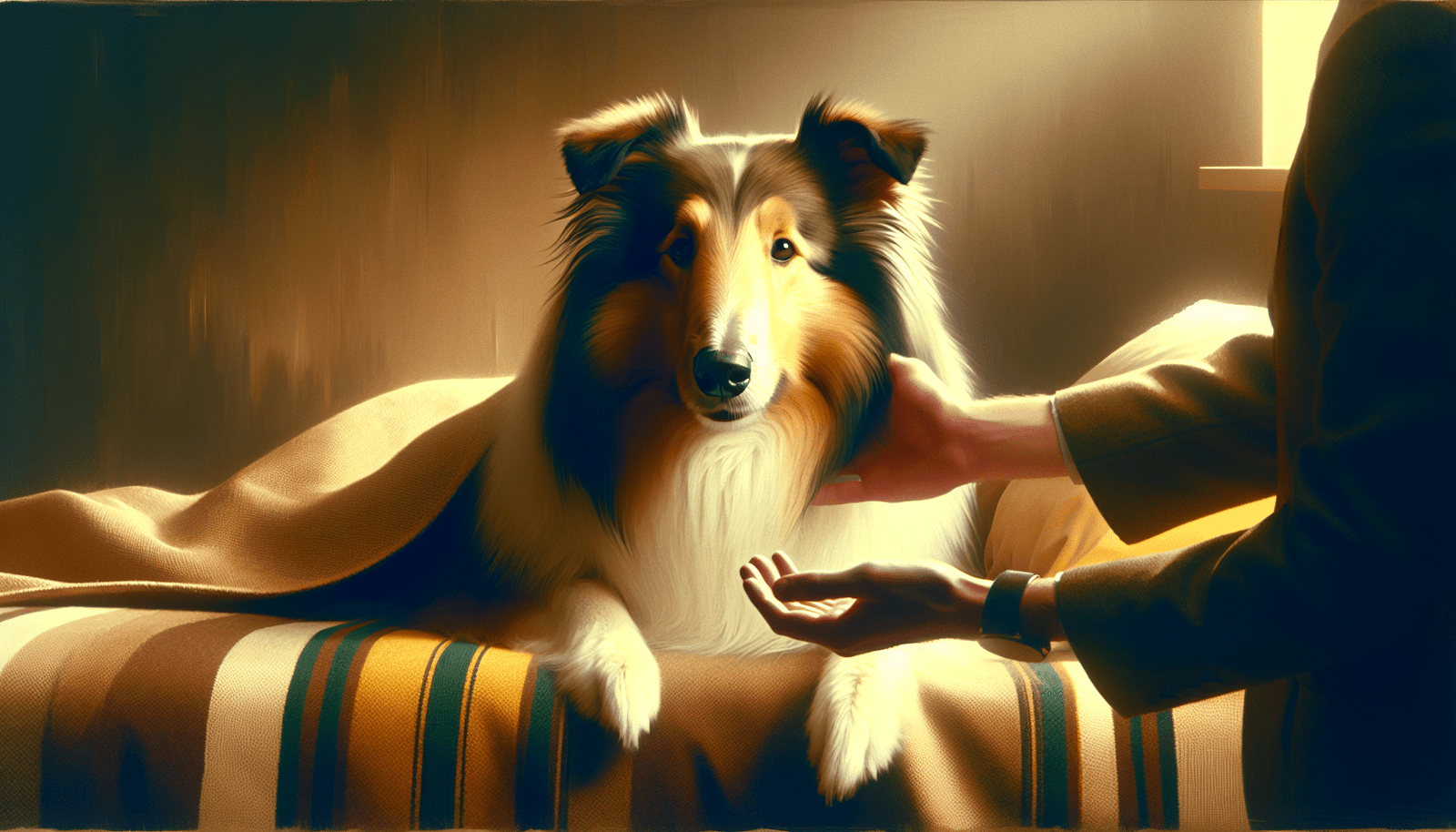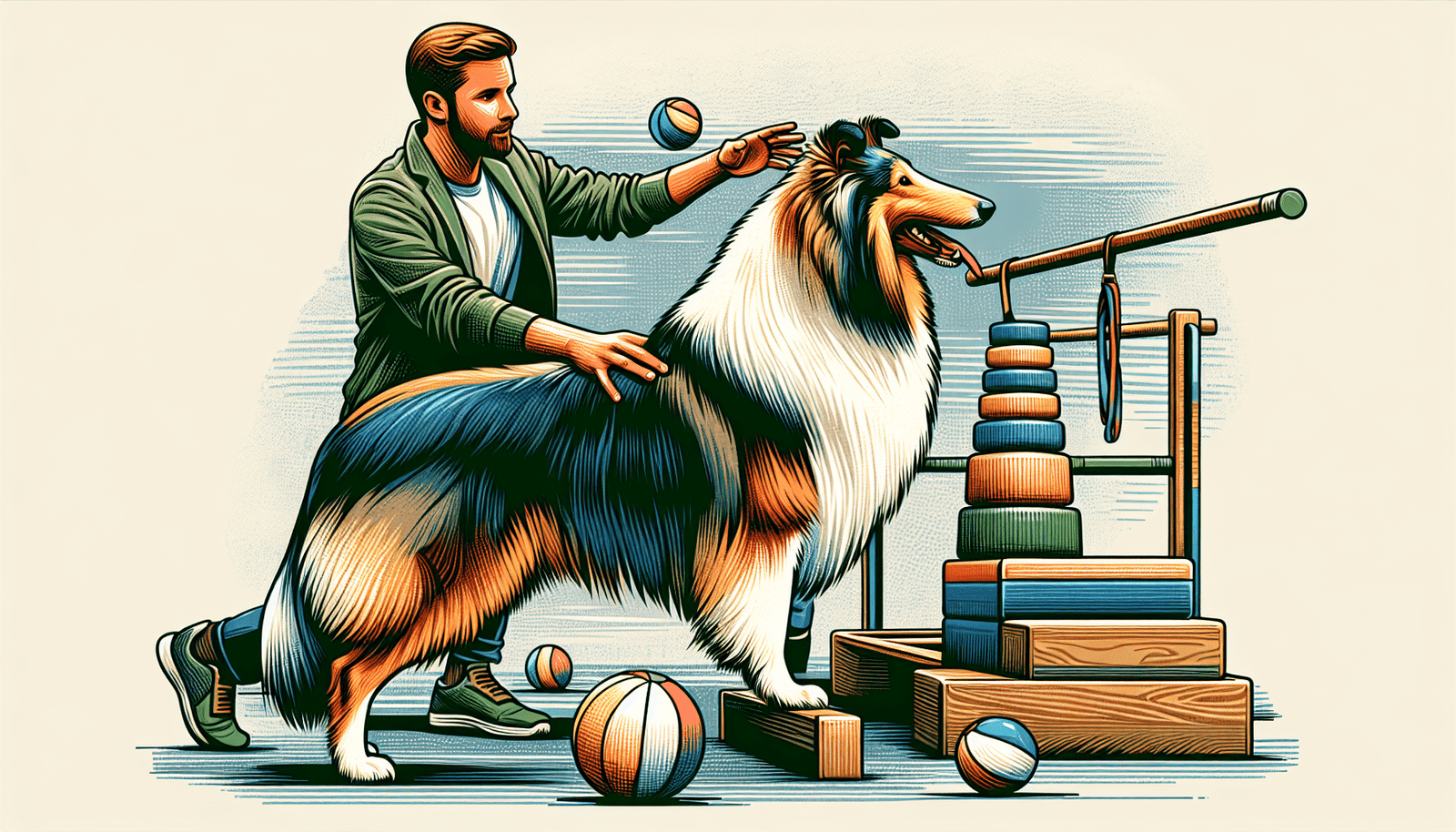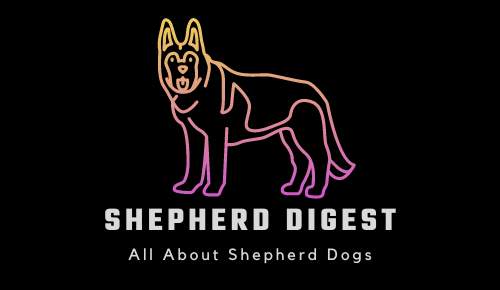If you’re looking to train your Rough Collie for therapy work, you may be wondering what the most effective approach is. Well, look no further! In this article, we’ll explore the best methods to train your Rough Collie for therapy work, ensuring they develop the necessary skills and temperament required for this rewarding role. Whether you’re a beginner or an experienced dog trainer, this guide will provide you with valuable insights and techniques to help your Rough Collie become a dependable therapy dog. So, let’s get started on this fulfilling journey together!
Understanding Therapy Work
What is therapy work?
Therapy work involves training and utilizing dogs to provide emotional support, comfort, and companionship to individuals in various settings such as hospitals, nursing homes, schools, and rehabilitation centers. These dogs are specifically trained to interact with people, helping to improve their emotional well-being and promote a sense of calm and happiness. Therapy work is a rewarding and fulfilling endeavor that has significant benefits for both the dogs involved and the individuals they interact with.
The role of Rough Collies in therapy work
Rough Collies are well-suited for therapy work due to their gentle, calm, and affectionate nature. Known for their intelligence and sensitivity, these dogs excel at providing comfort and emotional support to those in need. With their striking looks and soft fur, Rough Collies have a natural ability to make people feel at ease, creating a warm and welcoming environment. Their ability to empathize with emotions and their willingness to obey commands make them excellent candidates for therapy work.
Benefits of therapy work for Rough Collies
Engaging in therapy work can have a multitude of benefits for Rough Collies. Firstly, it provides them with a sense of purpose and fulfillment as they are able to positively impact the lives of others. The interactions and socialization opportunities they encounter during therapy work help to strengthen their bond with their handlers and build their confidence. Additionally, therapy work often involves exposure to different environments and situations, which promotes mental stimulation and prevents boredom. Overall, therapy work contributes to the physical and emotional well-being of Rough Collies, enhancing their overall quality of life.
Assessing Suitability
Temperament considerations
When considering a Rough Collie for therapy work, temperament plays a crucial role. These dogs should possess a calm and happy demeanor, showing no signs of aggression or fear towards humans or other animals. They should be receptive to training, willing to follow commands, and able to remain calm in various environments. Additionally, Rough Collies should exhibit a natural affinity for interacting with people, displaying gentle and patient behavior.
Health and physical requirements
Before engaging in therapy work, Rough Collies should undergo a thorough health evaluation to ensure they are fit for the role. This includes checking for any genetic health issues that could affect their well-being or ability to perform their duties. Regular exercise is important to keep them physically fit, as therapy work involves activities that may include walking, sitting, and interacting with individuals. A healthy diet, regular vet check-ups, and proper grooming are also essential to maintain their overall health and appearance.
Socialization and obedience training
Rough Collies should undergo extensive socialization and obedience training to prepare them for therapy work. Exposing them to various environments, such as crowded areas, medical settings, and noisy places, helps them develop confidence and adaptability. Introducing them to different people and animals ensures they are comfortable and well-behaved during interactions. Obedience training is crucial for therapy work, as dogs need to be able to follow commands promptly and reliably. Basic obedience training should include commands like sit, stay, and come, as well as walking on a leash without pulling and potty training.

Getting Started
Choosing the right age
When getting started with therapy work, it is important to consider the age of the Rough Collie. Puppies can be introduced to basic obedience training and socialization from a young age, helping them develop good habits and a solid foundation. However, it is generally recommended to wait until the dog is at least one year old before engaging in therapy work, as they need time to mature physically and mentally. This ensures they have the necessary self-control, focus, and impulse management skills required for therapy work.
Finding a reputable breeder or rescue organization
To ensure the suitability and well-being of a Rough Collie for therapy work, it is crucial to find a reputable breeder or rescue organization. A reputable breeder will provide information about the dog’s lineage, health history, and temperament. They will prioritize the overall health and temperament of their dogs, ensuring they are well-socialized from an early age. Rescue organizations can also be a great option for finding a Rough Collie with the right temperament for therapy work. It is important to thoroughly research and visit potential breeders or organizations, asking questions and observing the dogs’ living conditions and behavior.
Health checks and vaccinations
Before engaging in therapy work, Rough Collies must undergo a thorough health check-up by a trusted veterinarian. This includes vaccinations to protect them from common diseases and ensure they do not pose a risk to others. Regular check-ups are important to monitor their overall health and address any potential concerns. Maintaining proper hygiene, such as regular grooming and dental care, is also essential to keep them in optimal health for therapy work.
Basic Obedience Training
Sit, stay, and come commands
Basic obedience training is the foundation for successful therapy work. Rough Collies should be taught commands such as sit, stay, and come. These commands ensure the dog’s ability to remain calm and obedient during therapy sessions, allowing them to follow instructions promptly and reliably. Positive reinforcement techniques, such as rewards and praise, can be used to motivate the dog and reinforce desired behavior.
Walking on a leash without pulling
Walking on a leash without pulling is an important skill for therapy dogs, as they are often required to walk alongside their handler while interacting with individuals. Teaching the Rough Collie to walk politely on a leash helps prevent strain on the handler and creates a calm and controlled walking experience. Through consistent training and patience, the dog can learn to walk on a loose leash, without pulling or lunging.
Potty training
Potty training is essential for therapy dogs to ensure they can maintain cleanliness and avoid accidents during therapy sessions. Positive reinforcement techniques, such as rewards and consistent schedules, can be used to teach the Rough Collie to eliminate in appropriate areas. Crate training can also be beneficial in teaching them bladder control and providing a safe and comfortable space when not actively engaged in therapy work.

Socialization Training
Exposing the dog to various environments
Socialization training involves exposing the Rough Collie to a wide range of environments, both indoors and outdoors. This includes areas with different sights, sounds, and smells, such as busy streets, parks, and public buildings. Gradual exposure and positive reinforcement techniques can help the dog become accustomed to various stimuli, reducing the likelihood of fear or anxiety in new environments.
Introducing them to different people and animals
To ensure the Rough Collie is comfortable interacting with different individuals, it is important to introduce them to a variety of people of all ages, genders, and backgrounds. Encounters with friendly and well-behaved animals can also help the Rough Collie develop the necessary social skills for therapy work. Controlled introductions with other dogs or animals can aid in preventing any potential aggression or fear-based reactions.
Building positive associations
During socialization training, it is crucial to build positive associations with various stimuli. Offering treats, praise, and playtime during exposure to new environments, people, and animals can help the Rough Collie associate these experiences with positive emotions. This ensures that they look forward to therapy work and feel comfortable and confident during interactions.
Therapy Specific Training
Understanding the therapy work requirements
Therapy specific training involves understanding the specific requirements and expectations for therapy work. Handlers should familiarize themselves with the guidelines and regulations set by therapy organizations, ensuring that they align with the necessary standards. Understanding the expectations for the dog’s behavior, the handler’s role, and the specific settings in which therapy work takes place is essential in providing the best possible experience for the individuals being served.
Training for calm behavior in different settings
Therapy work often involves visiting various settings, including hospitals, nursing homes, schools, and rehabilitation centers. Training the Rough Collie to exhibit calm behavior in different settings is important to ensure they do not become overwhelmed or anxious. Gradual exposure to different environments, coupled with consistent reinforcement of calm behavior, helps the dog develop composure and adaptability, making them effective therapy companions.
Practice with therapy equipment
Therapy work may require the use of specific equipment, such as therapy vests, harnesses, or identification tags. Familiarizing the Rough Collie with this equipment through positive reinforcement can help them associate it with the rewarding experiences of therapy work. Regular practice sessions, including wearing the equipment and engaging in simulated therapy scenarios, can help the dog become comfortable and confident in their role.
Recall and Distraction Training
Teaching the dog to respond to their name
Recall training is crucial for therapy dogs, as they need to reliably respond to their name when called by their handler. Teaching the Rough Collie to come when called not only ensures their safety and control but also allows for smooth and efficient therapy sessions. Positive reinforcement techniques, along with regular practice and consistency, can help strengthen the dog’s recall response.
Training to ignore distractions
Distractions are inevitable in therapy settings, and training the Rough Collie to ignore them is important for maintaining focus and effectiveness in the role. This can be achieved through a variety of techniques, such as rewarding the dog for maintaining focus despite distractions or gradually increasing the difficulty of distractions during training sessions. Consistency and patience are key in teaching the dog to remain attentive and unfazed by external stimuli.
Building reliable recall
In addition to basic recall training, building a reliable recall in various situations is crucial for therapy work. This includes practicing recall exercises in different environments, such as busy streets or crowded rooms, to ensure the Rough Collie responds promptly and reliably. Positive reinforcement, consistent training, and gradually increasing the level of distractions can help strengthen the dog’s recall, ensuring their ability to follow commands even in challenging situations.
Advanced Obedience Training
Training for off-leash obedience
Advanced obedience training for therapy work may involve off-leash exercises. Teaching the Rough Collie to respond to commands without the constraint of a leash allows for greater freedom and flexibility during therapy sessions. Off-leash training should be approached gradually and in controlled environments, ensuring the dog’s safety and responsiveness. Consistent reinforcement of obedience commands and recall training are crucial for success in off-leash work.
Commanding more complex obedience tasks
As the Rough Collie progresses in their therapy work, they may encounter situations that require more complex obedience tasks. This could include tasks such as retrieving specific objects, assisting individuals with mobility challenges, or performing tricks to engage and entertain. Training for these tasks involves breaking them down into smaller, manageable steps and utilizing positive reinforcement techniques to ensure comprehension and success.
Maintaining focus amid distractions
Maintaining focus amid distractions is an important aspect of advanced obedience training for therapy dogs. This can be achieved through ongoing exposure to various stimuli, practicing in different environments, and gradually increasing the difficulty level of distractions. Consistent reinforcement, positive reinforcement techniques, and patience are key in training the Rough Collie to maintain their focus and obedience in the face of external distractions.
Behavioral Training
Preventing and managing separation anxiety
Therapy dogs may spend significant time away from their handlers, so preventing and managing separation anxiety is crucial for their well-being and effectiveness in therapy work. This involves gradually increasing the amount of time the Rough Collie spends alone, providing them with mental and physical stimulation during periods of separation, and creating a positive association with being alone through rewards and calm departures and arrivals.
Addressing fear or aggression issues
Addressing fear or aggression issues is essential to ensure the safety and well-being of both the therapy dog and the individuals they interact with. Recognizing signs of fear or aggression early on and addressing them through positive training techniques, desensitization exercises, and professional guidance can help the Rough Collie overcome these behavioral challenges. It is important to prioritize the safety and comfort of all individuals involved in therapy work.
Stress management techniques
Therapy work can be emotionally demanding for both the Rough Collie and their handler. Implementing stress management techniques, such as regular breaks, relaxation exercises, and positive reinforcement during and after therapy sessions, is crucial for the well-being of the dog. Creating a calm and stress-free environment, fostering a strong bond between the handler and the Rough Collie, and providing an appropriate balance of rest and physical exercise are essential in maintaining the dog’s emotional health.
Continued Learning and Practice
Attending therapy workshops or seminars
Continued learning and staying up-to-date with the latest techniques and knowledge in therapy work is important for both handlers and Rough Collies. Attending therapy workshops or seminars provides an opportunity to learn from experienced professionals, gain insights from fellow handlers, and stay informed about best practices and industry standards. These events also offer networking opportunities and a chance to exchange experiences and ideas.
Engaging in ongoing training sessions
Consistent training sessions are key to maintaining the skills and behaviors required for therapy work. Engaging in ongoing training sessions, both individually and with a group, helps reinforce previous training and further develop the Rough Collie’s abilities. Regular training sessions provide mental stimulation, strengthen the bond between the dog and their handler, and ensure they remain prepared and confident in their role.
Consistently practicing therapy work skills
The key to success in therapy work lies in consistent practice. Regularly engaging in therapy work sessions, even outside of scheduled visits, helps the Rough Collie maintain their skills, behaviors, and confidence. Consistent practice, including simulated therapy scenarios, reinforcement of obedience commands, and exposure to various environments, ensures the dog remains well-prepared and responsive in their role as a therapy dog.
In conclusion, training a Rough Collie for therapy work requires careful consideration, consistent training, and patience. The calm and gentle nature of Rough Collies, coupled with their intelligence and sensitivity, makes them ideal candidates for providing emotional support and comfort to those in need. Through extensive obedience training, socialization, and exposure to different environments, Rough Collies can develop the necessary skills to excel in therapy work. By engaging in ongoing learning, practice, and maintaining their overall health and well-being, Rough Collies can have a profound impact on the lives of individuals they interact with, while also experiencing fulfillment and purpose in their own lives.

